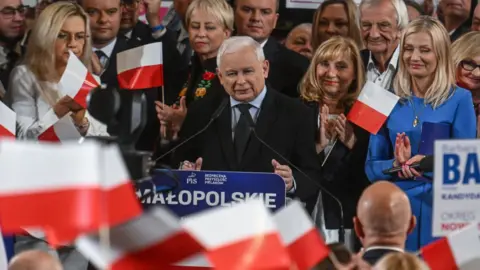Poland election: Poles prepare to vote as rivals end acrimonious campaign
 Omar Marques/Anadolu via Getty Image
Omar Marques/Anadolu via Getty ImagePoland elects a new parliament this weekend after a bitterly fought campaign that has seen each side paint the other аs a dire, national threat.
The governing, right-wing Law and Justice party, or PiS, is battling to secure a record third term in office.
It says the opposition would weaken Poland with mass migration and chaos.
The centrist main opposition Civic Coalition wants to end eight years of PiS rule, arguing that the party is a threat to Polish democracy itself.
Both campaigns have been highly personalised with each party demonising the other's leader.
But with opinion polls suggesting neither of the main parties is on course for an outright majority, the final days and hours of campaigning have been intense.
All over Poland, lamp-posts and railings are plastered with the images of election candidates.
They offer a choice from the far-right Confederation that wants to cut aid to Ukraine to a left-wing party that talks about LGBT rights and returning the right to abortion.
But this race has mostly focused on two men and two parties: PiS leader Jaroslaw Kaczynski and Civic Coalition head Donald Tusk.
 Beata Zawrzel/NurPhoto
Beata Zawrzel/NurPhoto On Friday, they made their final pitches to voters.
In Starachowice, south of Warsaw, Jaroslaw Kaczynski repeated his mantra that a Poland governed by Donald Tusk would in fact be ruled "by a phone call from Berlin or Moscow".
He has consistently painted his rival as a puppet of both Russia and Germany: the logic doesn't matter as much as the suggestion that Mr Tusk is unpatriotic and a security threat.
Mr Kaczynski pointed to his own party's massive boost in military spending, with both Russia and Ukraine on Poland's border.
Stoking fear about migration is another PiS favourite, including with endless footage on state TV highlighting protests and riots in Europe.
The party leader stressed that PiS would "absolutely reject" an EU relocation plan for illegal migrants.
But he also had a positive message for the final stretch of the campaign.
"We have offered Poles a better life," Mr Kaczynski told voters, mentioning higher wages and pensions. "This election is about whether that will continue."
- More from Sarah Rainsford: Vociferous campaign splits Poland ahead of key election
- Analysis: Why Europe is watching Poland's election
Donald Tusk contends that continuing with PiS would be a disaster.
While Poland has won plaudits for its role supporting Ukraine since the Russian invasion, there's real concern about its commitment to defending key elements of democracy at home.
The EU is withholding large amounts of funding over the politicisation of Poland's courts.
Civic Coalition highlights that issue, as well as increased control of the press and far more antagonism with Europe - trends that it worries will intensify if PiS are re-elected.
Some fear the trajectory is so bad, it could undermine Poland's membership of the EU itself.
On Friday, though, all Donald Tusk's talk was of winning.
"We are one step away from victory," he claimed in a final campaign speech, before urging supporters to monitor Sunday's election for fraud.
That includes abroad, where more than 600,000 Poles, a record number, have registered to vote. In the past, expats have favoured the opposition. Officials in the Netherlands have even urged people to head for Germany or Belgium instead, to avoid long queues.
The government has called a national referendum to be held in tandem with the election to parliament, posing questions that seem designed to get PiS supporters to the polls.
One asks whether "thousands of illegal immigrants" should be allowed into Poland, as "imposed" by the EU.
This week, PiS also announced cash payments for groups including brass bands and housewives' clubs in small municipalities - where it tends to do best - if more than 60% of voters come out to vote.
It has already increased the number of polling stations in such areas, arguing that boosting participation is good for democracy.
It is possible that neither PiS nor Civic Coalition will win enough to govern alone.
If Law and Justice wins most votes, it might try to govern as a minority or it could seek a coalition with Confederation, assuming the far-right party wins enough seats.
Either way, the prospect of a party with a record of racism and homophobia holding the key to power is disturbing to some.
Should that combination prove impossible, the door to an opposition coalition might open.
"A vote cast in these elections is not only an expression of our beliefs and values, it also determines the direction in which Poland should develop," the PiS-backed President Andrzej Duda urged voters on the last of campaigning.
"Today we have different visions to choose from."
That's one thing on which opposition supporters agree.
"We've had enough," an editorial in the Gazeta Wyborcza newspaper announced on Friday.
"If the democrats lose now, we will face pure authoritarianism in Russian-Turkish-Hungarian colours… But another Poland is within reach."
